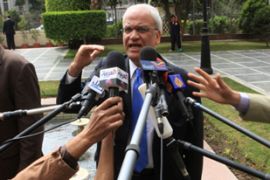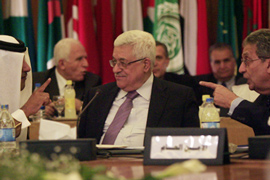Arab League backs Middle East talks
Ministers agree to give US proposal for indirect Israeli-Palestinian talks “final chance”.

Saeb Erekat, the Palestinian chief negotiator, told AFP news agency on Wednesday that the talks were agreed to “so that American efforts to revive the peace process will succeed”.
Erekat said that Arab League ministers would convene again in July if the indirect negotiations failed.
However, Yusuf al-Ahmed, Syria’s representative at the Arab League, said that the follow-up committee did not have the authority to approve the resumption of the talks.
“It was clear that the meeting … was aimed at providing an Arab cover for an already-taken Palestinian decision to hold indirect negotiations with Israel with no guarantees,” al-Ahmed said.
Israel welcomes decision
Israel welcomed the endorsement of the proposal on Wednesday.
“[Israeli] prime minister [Binyamin] Netanyahu has been calling for the resumption of talks for some time and we hope now that the talks can move forward,” Mark Regev, a spokesman for Netanyahu, said.
 |
| Abbas, centre, listens to Mussa, right, and Qatari foreign minister, Sheikh Hamad bin Jassim al-Thani [AFP] |
Rawya Rageh, Al Jazeera’s correspondent in Cairo, said: “Palestinian President Mahmoud Abbas called this meeting at the Arab League and he got what he wanted – Arab support.
“He did not want to come across as the man who yielded to American pressure to agree to these indirect talks.”
Arab delegates said talks should be based on the principles of a 2002 Arab peace initiative which calls for full normalisation with Israel in exchange for a complete withdrawal by Israel from Arab land, the creation of a Palestinian state and an “equitable” solution for Palestinian refugees.
“What has prevented [Palestinian] president [Mahmoud] Abbas from pursuing negotiations is the continued policy of settlements,” Yusef bin Alawi bin Abdullah, Oman’s chief diplomat, said on Tuesday.
He said that any negotiations must be during Netanyahu’s term of office.
Abbas said on Tuesday he would base his decision on whether to join indirect talks on the outcome of the meeting.
“We, the Palestinian side, will abide by what is decided at this meeting,” he said.
Nabil Abu Rudeina, a Palestinian spokesman, had called on delegates to accept the principle of indirect talks.
“Israel does not want to return to the negotiating table,” he said.
“But it wishes to blame the Palestinian side, saying that the Palestinians do not want to enter into negotiations.
“So we must put a stop to this pretext and reveal Israel’s true position before the international community and the American administration.”
‘No direct talks’
Abu Rudeina said the indirect negotiations would be through George Mitchell, the US Middle East envoy, insisting that direct negotiations were not on the agenda.
“There is currently no idea to hold direct negotiations. The Palestinian and Arab positions on this matter are clear – there must be a clear reference for negotiations and the complete halt of settlements,” Abu Rudeina said.
However, Israel has only agreed to a 10-month freeze on settlements that excludes public buildings and annexed Arab east Jerusalem.
On Friday, Haaretz, the Israeli daily newspaper, reported that the government had given the go-ahead for 600 new homes in a Jewish settlement in east Jerusalem.
The Arab Follow-Up Committee has representatives from Algeria, Bahrain, Egypt, Jordan, Kuwait, Lebanon, Morocco, Oman, Qatar, Saudi Arabia, Sudan, Syria, Tunisia, the United Arab Emirates and Yemen, as well as the Palestinian Authority.